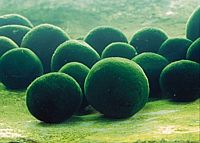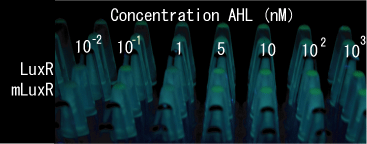Chiba
From 2007.igem.org
(→Introduction) |
|||
| (36 intermediate revisions not shown) | |||
| Line 2: | Line 2: | ||
[[Image:chiba_logo.png|center]] | [[Image:chiba_logo.png|center]] | ||
__NOTOC__ | __NOTOC__ | ||
| - | {| style="border:0;width:100%;" cellpadding="20px" cellspacing="0" | + | {| style="border:0;width:100%;font-family:'Trebuchet MS'" cellpadding="20px" cellspacing="0" |
| align="center" | | | align="center" | | ||
| - | [[Chiba|Introduction]] | [[Chiba/Project_Design|Project Design]] ( [[Chiba/Engeneering_Flagella|1.Affinity Tag]] | [[Chiba/Communication|2.Communication Module]] | [[Chiba/Quorum_Sensing|3.Size Control]] ) | [[Chiba/Making Marimo|Making Marimos]] | [[Chiba/Goal|Our Goal]]<br> | + | [[Chiba|Home]]<br> |
| + | <span style="font-size:120%;font-weight:bold;">[[Chiba/Introduction|Introduction]] | [[Chiba/Project_Design|Project Design]] ( [[Chiba/Engeneering_Flagella|1.Affinity Tag]] | [[Chiba/Communication|2.Communication Module]] | [[Chiba/Quorum_Sensing|3.Size Control]] ) | [[Chiba/Making Marimo|Making Marimos]] | [[Chiba/Goal|Our Goal]]</span><br> | ||
[[Chiba/Acknowledgements|Acknowledgements]] | [[Chiba/Team_Members|Team Members]] | [http://chem.tf.chiba-u.jp/igem/ iGEM Chiba Website] | [[Chiba/Members_Only|メンバ連絡簿]] | [[Chiba/Acknowledgements|Acknowledgements]] | [[Chiba/Team_Members|Team Members]] | [http://chem.tf.chiba-u.jp/igem/ iGEM Chiba Website] | [[Chiba/Members_Only|メンバ連絡簿]] | ||
|} | |} | ||
| - | == | + | ==Project Overview== |
| - | [[Image: | + | [[Image:Chiba_marimobig.jpg|frame|'''photo. 1''' Marimo in the lake]]Our iGEM project is to make a '''Marimo-ish gathering of bacteria'''. Marimo is a green spherical shaped algae (shown in Fig.1), which is a popular living organism in Japan as a National Treasure because of its beautiful shape and its smoothness. |
| - | + | ===[[Chiba/Introduction|Introduction: Why We Make a Marimo]]=== | |
| + | ====Spherical Multicellular Organism!?==== | ||
| + | When you see a shape in Nature, you will notice whether a sphere, which is absolutely symmetric in 3D, is really stable or not in Nature. | ||
| + | In fact, an oil droplet is a sphere in water. Red blood cell in a hypotonic solution shows its shape change to a spherical balloon. | ||
| + | However multicellular organisms have their shape different from a sphere except Marimo. Of course, other algae do not show spherical shape, they live on a surface of stone. | ||
| + | It is quite intriguing how Marimo remains its spherical shape in a lake! | ||
| - | + | Our team focuses understanding how such spherical structure can be sustained even when it Is multicellular organisms.<br> | |
| - | + | [[Chiba/Introduction|more...]] | |
| - | + | ||
| - | + | ||
| - | + | ||
| - | + | ||
| - | + | ||
| - | + | ||
| - | + | ||
| - | + | ||
| - | + | ||
| - | + | ===[[Chiba/Project Design|Project Design: How To Make Our Marimo]]=== | |
| - | + | [[Image:Chiba_marimosystem.png|frame|'''scheme. 1''' Our marimo system.]]What we require to our system is as follows: | |
| - | + | #Affinity Tag. | |
| - | + | #Communication Module. | |
| - | + | #Size Control. | |
| + | Two cells are used in our system: AHL senders and receivers. Senders generates the affinity tags constitutively, while receivers generates them only when they are induced by AHL. The marimo-forming goes like this: | ||
| + | *Make the sender core by sticking with the affinity tag. | ||
| + | *Insert the sender core into the receiver culture. | ||
| + | *The sender core produces AHL, which make the near receivers to generate the affinity tags and GFPs. | ||
| + | *The affinity tagged receiver sticks with the central sender core. This will continue until the AHL cannnot reach the marimo boundary, | ||
| + | *When the AHL reached the marimo boundary, the adsorping stops, which makes a finite-sized marimo bacteria. | ||
| + | [[Chiba/Project Design|more...]] | ||
| - | + | ==Experiments Overview== | |
| - | + | ===[[Chiba/Engeneering_Flagella|Making Affinity Tags]]=== | |
| + | [[Image:Chiba_flichisgene.png|frame|'''scheme. 2''' The short peptide with six histidine (“His-Tag”) was inserted into the fliC D3 domain.]] | ||
| + | #Make the affinity tag by inserting the his-tag into the flagellar fillament. | ||
| + | #*[[Image:Chiba_check.png]] Sequence confirmed | ||
| + | #*[[Image:Chiba_check.png]] Swarm confirmed | ||
| + | #*[[Image:Chiba_check.png]] Flagella strained with anti-flagella antibody | ||
| + | #*[[Image:Chiba_check.png]] Phenotype confirmed | ||
| + | #*[[Image:Chiba_check.png]] Affnity confirmed | ||
| + | [[Chiba/Engeneering_Flagella|more...]] | ||
| + | <br clear="all"> | ||
| - | + | ===[[Chiba/Communication|Making Communication Module]]=== | |
| + | [[Image:BBa I729005 circuit.jpg|frame|'''scheme.3''' New parts BBa_I729005.]] | ||
| + | #Making Receivers | ||
| + | #*[[Image:Chiba_check.png]] AHL > GFP generator (constitutive aiiA) : BBa_T729006 | ||
| + | #*[[Image:Chiba_check.png]] AHL > GFP & aiiA generator : BBa_I729005 | ||
| + | #*[[Image:Chiba_check.png]] Sensitive AHL > GFP generator : BBa_I729004 | ||
| + | #*[[Image:Chiba_nocheck.png]] inverter-aiiA | ||
| + | #Making Senders | ||
| + | #*[[Image:Chiba_nocheck.png]] MetK Sender : Could not deposit to registry | ||
| + | [[Chiba/Communication|more...]] | ||
| - | + | ===[[Chiba/Quorum_Sensing|Controlling Size]]=== | |
| + | [[Image:MLuxR-test.gif|frame|'''photo. 2''' Improved Receiver.]] | ||
| + | #Improve Sender | ||
| + | #*[[Image:Chiba_check.png]] Overexpressed the metK (the AHL precursur synthesis enzyme) in the hope to increase AHL synthesis. : Turned out not to work | ||
| + | #Improve Receiver | ||
| + | #*[[Image:Chiba_check.png]] Inserted 2 mutations in LuxR which is known from the paper to increase activity. | ||
| + | #Localize AHL | ||
| + | #*[[Image:Chiba_check.png]] Tested the GFP expression in constitutive aiiA generator receiver : Went too much. | ||
| + | #*[[Image:Chiba_check.png]] Tested the GFP expression in AHL-induced aiiA generator receiver : Needed to twist the circuit more. | ||
| + | #*[[Image:Chiba_nocheck.png]] AHL-induced inverter aiiA receiver. Not yet assembled. | ||
| + | [[Chiba/Quorum_Sensing|more...]] | ||
| - | + | ===[[Chiba/Making Marimo|Making Marimo]]=== | |
| + | #[[Image:Chiba_nocheck.png]] Moving FliC-His generator. : Not yet assembled. | ||
| + | #[[Image:Chiba_nocheck.png]] FliC-his biobrick : Not yet assembled. | ||
| + | [[Chiba/Making Marimo|more...]] | ||
| - | + | ==[[Chiba/Goal|Our Goal]]== | |
| + | Although we could not reach them, below we describe the goal that we set to make a marimo bacteria. | ||
| + | *A test of adsorption between flagella | ||
| + | *A test to confirm a limit of size | ||
| + | *A test to form Marimo | ||
| + | *A test of size control | ||
| + | [[Chiba/Goal| See Details]] | ||
| - | + | ===[[Chiba/Goal#In the Long Run|In the Long Run]]=== | |
| + | See [[Chiba/Goal#In the Long Run|here]] : our brainstorming of the marimo future! | ||
| - | + | [[Chiba/Goal|more...]] | |
| - | + | ==Sponsers== | |
| - | + | <center> | |
| - | + | [[Image:Chiba_Knowledge.jpg]] | |
| - | + | [[Image:Chiba_yakukensha.gif]] | |
| - | + | [[Image:Chiba_Stratagene.gif]] | |
| - | + | [[Image:Chiba_Greiner.gif]]<br><br> | |
| - | + | [[Image:Chiba-u.gif]] | |
| - | + | </center> | |
| - | + | ||
| - | + | ||
| - | + | ||
| - | + | ||
| - | + | ||
| - | + | ||
| - | + | ||
| - | == | + | |
| - | + | ||
| - | [[Image: | + | |
| - | + | ||
| - | + | ||
| - | + | ||
| - | + | ||
| - | + | ||
| - | + | ||
| - | + | ||
| - | + | ||
| - | + | ||
| - | [[Image: | + | |
| - | + | ||
| - | + | ||
| - | [[ | + | |
| - | + | ||
| - | + | ||
| - | + | ||
| - | + | ||
| - | + | ||
| - | < | + | |
| - | + | ||
| - | + | ||
| - | + | ||
| - | + | ||
| - | + | ||
Latest revision as of 06:44, 27 October 2007
|
Home |
Project Overview
Our iGEM project is to make a Marimo-ish gathering of bacteria. Marimo is a green spherical shaped algae (shown in Fig.1), which is a popular living organism in Japan as a National Treasure because of its beautiful shape and its smoothness.Introduction: Why We Make a Marimo
Spherical Multicellular Organism!?
When you see a shape in Nature, you will notice whether a sphere, which is absolutely symmetric in 3D, is really stable or not in Nature. In fact, an oil droplet is a sphere in water. Red blood cell in a hypotonic solution shows its shape change to a spherical balloon. However multicellular organisms have their shape different from a sphere except Marimo. Of course, other algae do not show spherical shape, they live on a surface of stone. It is quite intriguing how Marimo remains its spherical shape in a lake!
Our team focuses understanding how such spherical structure can be sustained even when it Is multicellular organisms.
more...
Project Design: How To Make Our Marimo
What we require to our system is as follows:- Affinity Tag.
- Communication Module.
- Size Control.
Two cells are used in our system: AHL senders and receivers. Senders generates the affinity tags constitutively, while receivers generates them only when they are induced by AHL. The marimo-forming goes like this:
- Make the sender core by sticking with the affinity tag.
- Insert the sender core into the receiver culture.
- The sender core produces AHL, which make the near receivers to generate the affinity tags and GFPs.
- The affinity tagged receiver sticks with the central sender core. This will continue until the AHL cannnot reach the marimo boundary,
- When the AHL reached the marimo boundary, the adsorping stops, which makes a finite-sized marimo bacteria.
Experiments Overview
Making Affinity Tags
- Make the affinity tag by inserting the his-tag into the flagellar fillament.
Making Communication Module
- Making Receivers
- Making Senders
Controlling Size
- Improve Sender
- Improve Receiver
- Localize AHL
Making Marimo
Our Goal
Although we could not reach them, below we describe the goal that we set to make a marimo bacteria.
- A test of adsorption between flagella
- A test to confirm a limit of size
- A test to form Marimo
- A test of size control
In the Long Run
See here : our brainstorming of the marimo future!






